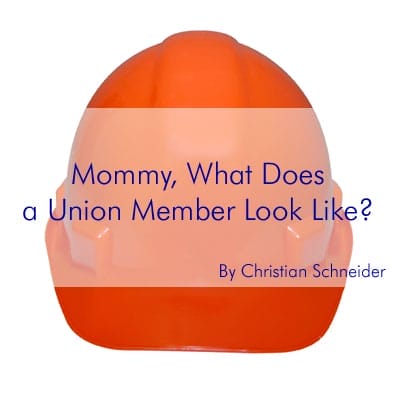The stereotype of the typical union member is time-tested. Union Man is a pot-bellied factory worker or tradesman making a good living despite never having graduated college. He wears an old flannel shirt and muddy work boots. And much like the Catholic Church hierarchy, in which the bigger your hat, the greater your importance, union status is conferred on those with the largest mustaches.
Union Man believes in the strength of numbers—that the security of his job depends on the security of his colleagues’ jobs, even if he knows he works harder than they do. He’s suspicious of people who make more money than he does, and Union Man thinks “the rich” aren’t paying their “fair share.”
As such, Union Man supports Democratic candidates with both his union dues and his vote. And he isn’t afraid to vote against his best interests if it means sticking it to management.
In Wisconsin, this stereotype was most recently reinforced by the saga of Mercury Marine, a small-engine factory near Sheboygan that faced falling revenues and a beckoning suitor in Oklahoma. Mercury asked its union for concessions or suffer the closing of the plant. It took the workers three contested votes to reach a deal to save their jobs.
As this charade rolled on, the public gazed, incredulously, at the union members in their natural habitat, tempting the catastrophic closing of their plant with their obstinacy. Thus, the age-old stereotype of the union simpleton as hardhat economic illiterate gained currency.
But not so fast.
In reality, the typical union member is a very different person. A statewide poll conducted in September by the Wisconsin Policy Research Institute (publisher of this magazine) found the typical union member to be female, with a college education, making more than $75,000 per year. Of the union households responding to the survey, 79% had attended college, with 14% completing graduate work.
Even more intriguing, the typical union household is much more fiscally conservative than traditional stereotypes would suggest. Among union members, 52% listed either “holding the line on taxes and government spending” or “improving the state’s economy and protecting jobs” as the top priority of the Legislature. Traditional union priorities, such as making health care and prescription drugs more affordable (12%), scored much lower than expected.
Among union households, President Obama is still popular, with a 64% approval rating. Yet Gov. Jim Doyle, who is to Wisconsin unions what Hugh Hefner is to teenage boys, actually has a high unfavorability rating, with 49.7% rating him “somewhat” or “very” unfavorably. This is even higher than the 47.4% unfavorable rating Doyle received from the public at large.
So put away the stereotype of the typical union member. Forget about the picketing goon and consider the professional woman who tends to be an economic conservative. How did our perception get so wrong?
For one, unionization in America has been changing rapidly. According to the census, 20% of workers in the U.S. were union members in 1983. Twenty-five years later, union membership has dropped to 12% of the workforce. Yet membership remains high in public-sector jobs, with government workers five times more likely to be union members than their private-sector counterparts. And within government, education and library service jobs were the most heavily unionized, at 38.7%.
As we know, “education” and “library” jobs have traditionally meant “women.” And that is why, after men held a 10-point lead nationally over women in union membership in 1983, it appears professional women may have crept ahead in Wisconsin in 2009.
And these women, despite being unionized government employees, are educated, well paid, and shell out a boatload in taxes. Which may explain, in large part, why they may be more apt to be skeptical of government.
For instance, when asked whether government should guarantee every citizen a job and a good standard of living, 67% of union households objected to the notion—even higher than the overall 65% “no” from the general public.
So when you’re out at a restaurant and commenting on the typical “union goons,” remember: Today’s union members walk among us, like chameleons adapting to their new environments. Their changed appearance has thrown our “union-dar” out of whack, so it’s much more difficult to tell who might be a card-carrying AFL-CIO member.
And today’s union members may be more reasonable than we remember. Before conservatives write them off, it might bear electoral fruit for Republicans to get to know them better.
After all, these are not your father’s unions.
Christian Schneider, a former legislative staffer, is a fellow at the Wisconsin Policy Research Institute.





